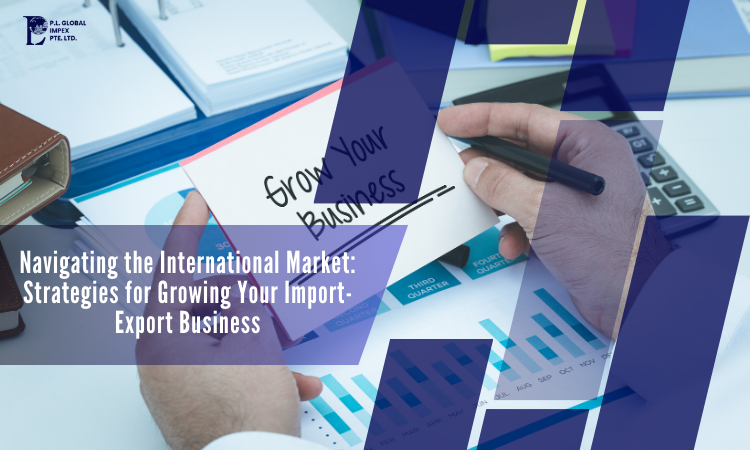Introduction:
Welcome to our blog! Are you looking to begin a profitable import-export business? You’re at the right place! In this article we will examine the critical tools and methods every import-export entrepreneur must know. Be it the supply chain management or the finding of credible partners, we’ve got your back. Let’s jump right into the realm of import-export business and open the doors to its prosperity.

1. The Ultimate Guide: Essential Tools for Running a Profitable Import-Export Business
Nowadays, to survive the tough competition and thrive in this globalized economy, you need something more than just making high-quality products and coming up with a sound business scheme. For this kind of business, it is most important to have effectively planned logistics, to be a leader in the regulation process of the international community, and to be unsurpassed in the competition world. Besides being unfortunate, global trade has a wide array of applications that can aid in the smooth running of your import-export business and boost profits. Here, we outline the essential tools that every import-export business should consider implementing:
Global Trade Management Software:
International shipments entail interacting with different entities, filling in customs documentation, and meeting with various regulations can be intimidating. Global trade management software helps with a range of these tasks by bringing all the key information together in a central location and automating operations concerning cargo tracking, duties calculations, and trade documentation.
Market Research Tools:
Concerning market trends, consumer preferences, and competitor strategies, the issue of researching information must be carried out properly to opt for the best decisions in the businesses. Market research instruments help you to have a deeper insight into the target markets as you can find out the hidden opportunities for your business and you can prevent the risks by understanding the hidden factors in these markets.
Freight Forwarding Platforms:
When it comes to the subject of transport logistics in the context of import-export business, the most important things to be taken into consideration are the cost-effectiveness and reliability of the transport options. Freight forwarding platforms such as Flexport and Freightos are now available for the comparison of shipping rates, booking of cargo space, and “follow shipment” in real-time support the business which can reduce the cost of shipping and the time of waiting.
Online Payment Systems:
The exchange of the various currencies among transnational activities poses a backward task and usually costs a lot. Implementing e-payment options, such as PayPal or Stripe, will aid cross-border payment transactions and reduce transaction costs, making payments transparent.
E-commerce Platforms:
The digital era is the one which is the most powerful time for the export-import business because it is impossible to achieve a good online presence without it. The internet stores like Shopify or WooCommerce are built with user-friendly interfaces for both the building and the management of the stores. They can aid you in building a blockbuster business and you can at the same time assist in enhancing your sales.

2. Mastering the Art of Import-Export: Key Strategies for Success
Along with the international business and markets growing, more companies are seeking to have their presence in import-export desks to be highly competitive. The skill of trade goes beyond merely trading products internationally, rather it involves myriad other aspects that very much determine success in the field. Here strategies and planning as shown in the multi-dimensional display of the factors it entails, ways and means of going around the market, and an overall knowledge of the environment are imperatively considered. Research is one of the main elements of this business success because it is needed to keep up with the top trends and practices in the industry.
Market research constitutes the basis and the buttress of any successful import and export campaign. It Assists in the identification of economic regions, determining market potential, understanding consumer preference, analyzing competitor strategies, and evaluating the viability of products or services in the markets. From gathering key insights and data, firms are able to make informed decisions and have an agile approach that maneuvers them into making the highest profits possible.
To start with, companies, therefore, have to plot the markets in order to explore the locations with the highest number of potential buyers. A research process including the study of the culture of these markets, pricing strategies, local laws and regulations, and competition, should outline know-how that might become a resource. The understanding of these ingredients of the market can help the organizations adjust their processes, advertising, and sales in order to satisfy the specific requirements of the target consumers.
In addition, the competition research is one of the key aspects of the market research. Through the investigation of competitors’ strengths and weaknesses, businesses discover these weaknesses and, in turn, can prepare themselves and ultimately get a competitive advantage. Hence this information can help entrepreneurs build their unique selling propositions, devise prices, and develop market-related marketing campaigns.
Besides that, market research enables the firms to compare the ability to introduce their goods or services in a particular market. By analyzing customer feedback, trend of demands, and existing competition, businesses can plan their probable product modulations, pricing adjustments, or maybe the multitasking of entering a new market.

3. Unlocking Success: 5 Essential Tools for Your Import-Export Company
In a world where international trade is done at the speed of light, it is necessary that the import-export businesses have complete armaments in order to be successful. To maintain the edge in the highly competitive global market and grow your business, you need to possess a set of crucial tools that will relieve you from some operational activities and put you one step ahead of your business competitors. We will discuss briefly the necessary instruments that your firm should have for the industry of import and export in this section.
Reliable Logistics Management System:
An efficient logistics management systems denotes the ubiquitous success of any import-export company. This opens up the possibility of creating an integrated logistics management plan where you can plan, organize, direct, and control the movement of goods across the whole supply chain. This ensures timely delivery and reduces risks and costs at the same time. Look for one that enables real-time tracking, automated documentation, and instantaneous exchange of elements including supplier information, shippers, and customer messages.
Market Research and Analysis Tools:
Accruing know-how is crucial in the realm of import-export. Dedicating resources to system integration tools and frameworks will enable you to gather invaluable data on consumer habits, emerging trends, and your competition. These tools will give you context for your subject matter and will help you make decisions based on accurate information, identify numerous business opportunities, and approach your target audience in a creative and attractive way.
Compliance and Risk Management Software:
International trade performance means working on diverse rules and regulations in human practice. In order to guarantee compliance with the import-export legislation and reduce risks, take into account the option with software in compliance and risk management. These tools will empower you to monitor the regulations, keep profiles current, and assess and manage risks related to the asset classes of commerce and finance.
International Payment Solutions:
Flawless and trustworthy financial transactions are the basics for each successful business entity dealing with the import and export of goods. While searching payment tactics, keep in mind options that allow you to use multiple currencies, clearly state the cost, and have strong security mechanisms. Such tools will facilitate and secure the payments, and the costs associated with currency exchanges will be reduced while timely payments to the suppliers will be guaranteed
Customer Relationship Management (CRM) System:
Building solid partnerships with clients is critical when looking at delivering long-term export-import businesses. The CRM system can automate the process of storing customer data and also taking care of customer interactions, keeping track of profitable sales opportunities, and consolidating marketing efforts. When searching for a CRM system look for one that has capabilities to manage contacts, track your leads, and provide you with analysis features that would help you to enhance your customer engagement and increase revenue.

4. Navigating the International Market: Strategies for Growing Your Import-Export Business
As an import-export business, the development of your company’s outreach to the international market can be a breakthrough point for the increase of your company’s growth. The global market offers substantial opportunities as well as challenges at the same time. Here we want to delve into the keys to the success of your business on the international market.
Research and Identify New Markets:
Prior to entering any new markets, you must conduct international market research in order to determine which markets will be most relevant to your company’s objectives. Market trends, consumer preferences, and regulatory requirements factors are the most important factors that you should consider to make the right decisions.
Develop a Strong Network:
Cultivating a viable network is, however, the key to overcoming the challenge of the international market. Forge relations with neighborhood distributors, agents, and suppliers, will help us register the essence of foreign markets and navigate the highly competitive environment too. Engaging in trade shows, hosting exhibitions, and participating in entrepreneurial network functions are some of the ways to help you make partnerships with interest firms.
Understand Cultural Differences:
Cultural subtleties will exert a great influence on the process of international business deals. Make an effort to have a clear comprehension of the cultural specifications of a country of destination as you enter the market. Among others, this involves tackling issues such as customs, languages, business etiquette, and even packaging requirements. What will work for your brand is to make customized strategies to fit the taste of your target market, and then you will have an edge over the competitors.
Build a Strong Online Presence:
In the current digital age, businesses swimming. It is best for anyone to have a strong online presence. Designing a professional website and performing a revision of it for search engines is a way to gain as much visibility in the international market as possible. Identify the most relevant social media channels, design an appropriate content marketing strategy, and use suitable online ad campaigns to attract your clients and advertise your products or services.
Stay Compliant with Trade Regulations:
International trade is a complex system with a wide range of regulations. Get yourself updated on the import-export laws, duty rates, sanctions, and other trade barriers that might affect you in your target markets. Compliance with these regulations is obviously important to secure the smooth running of operations and avoid legal entanglements.

5. Taking Your Import-Export Business to New Heights with Cutting-Edge Tools
Conversely, nowadays, the import-export business market has turned out to be much more competitive in the context of the globalized economy. In order to survive in the rapidly changing environment of import-storage business, it is necessary for agencies to pick up the best possible cutting-edge tools that are meant for streamlining operations, improving effectiveness and achieving higher profitability. In this blog post, we aim to explore the current cutting-edge tools and tech that can really take your import/export business to a whole new upscale level.
International trade company executives understand all the complexity involved in handling diverse suppliers, customers, as well as transport systems. All in all, even though struggles cannot be eliminated, they can be intelligently addressed. One of the instruments in this case is state-of-the-art practical software for supply chain management. Such technology assists you in operating your supply chain in an optimal manner by giving you actual time views of goods in transit, delivery, and condition of the inventory. With the capability of observation and recording the process at every stage, one can see the shipment minimize the delays, ensure prompt delivery and so build great networks with the consumers.
Another great helper that you can find very useful is the modern and up-to-date export-import compliance software. Respecting international trade laws is essential for expanding a business globally, both to stay out of trouble and to keep up a positive reputation. By implementing high-standard compliance software, you will be able to fill a majority of the compliance procedures with automation, which aids in compliance with the constantly evolving regulations. This saves not only time but also resources, which is not only a necessity for our customers but also a feature that minimizes the risk of non-compliance with the regulations.
Also, these data analytics tools help to highlight the market trends, pricing, and consumer behaviors and analyze your competitors across various platforms. Through such knowledge, you should be able to determine the most viable sourcing option, implement the best pricing strategy, and take advantage of market expansion chances. Now, thanks to the ever-expanding selection of data analytics tools at hand, even smaller trading companies can enjoy the advantages of data-driven decision-making.
6. Efficiency is Key: Must-Have Tools for Streamlining Your Import-Export Operations
The importer-exporter industry is a competitive arena where business owners exert every effort and resource to achieve a substantial edge in the market. Handling global trade is one of the key functions of any country. The dynamics of making it more efficient drastically change from strategies to methodology, because time is money and every minute matters. Having the proper tools on hand is crucial if you want to optimize output and simplify your processes. These specific tools are indispensable for the success of your import and export business, which, undoubtedly, will take it to the next level.
Trade Management Software:
An enhanced trade management software can completely redefine your import-export operations to a new level. This tool can automate your documents, follow or track the shipment, and control your inventory in a shorter while, which leaves you with the resources and time to use on other productive and more profitable activities.
Global Trade Compliance Solutions:
Due to the changing nature of trade rules, compliance with the trade regulations is essential to the future success of your import-export business. Whether you are a seasoned importer or an SME planning to take a first step into international markets, having a reliable partner for all the trade compliance issues will help you sleep easy at night, no matter the geographic challenges, mitigating any risks of fines or customs clearance delays.
Supply Chain Visibility Platforms:
Maintaining strong supervision over the supply chain is one of the indispensable characteristics of an efficient import-export business. The implementation of the supply chain visibility platform with a clear and real-time visualization of the shipment status allows you to monitor the supply chain entirely, ensuring timely delivery and minimizing disruptions.
Online Marketplaces:
The internet market revolutionizes the way import-export is done. Through these platforms, a seller and a buyer are connected in a humongous network that circumvents the barriers to transactionality with ease.
Digital Payment Solutions:
In contrast to the existing methods of payment that is too time-consuming and prone to errors. Leveraging online payment instruments besides, makes sure that you carry out payment transactions fast and in a safe way, while providing an effective solution to your cash management problems, in turn, resulting in your production processes being optimized.

7. Staying Ahead of the Competition: Innovative Strategies for Import-Export Success
Today, the import and exportation sector is highly competitive. Differentiating oneself from other players is important for a business to grow and survive in the long run. One distinctive way of gaining more recognition in online business is to concentrate on your growing digital presence.
In the age of fast-paced technology advancements and an ever-growing digital trend of online business operations, having a smooth online presence in place proves to be a must. Visualizability, ease-of-reach, and credibility of your import-export company are important irrespective of whether you are targeting potential partners or clients.
For your company to have a strong digital presence, the first thing that you should do is to come up with a professional website which clearly highlight your business profile, services as well as your expertise. Optimize it with the relevant keywords, those are words such as “import-export business” and “import-exit company,” to enhance your rankings on search engines and increase organic traffic.
Emphasizing the importance of content marketing is, in addition, another key component of the process of strengthening the digital presence. Frequently publish top-notch blog entries and articles, which focus on import-export business trends, market analytics, advice, and success stories. Not only it makes your company recognizable but it also strengthens your position as an industry thought leader and increases your credibility and experience.
Spreading your network throughout social media channels is equally very important. Identify the best platforms for your business including; LinkedIn, Twitter, and Facebook where you can keep constant communication with your audience by; sharing value content, industry updates, and success stories. Focus on creating a devoted followers base as well as prospective clients.
In addition, the strength of digital marketing tools such as SEO and PPC also needs to be harnessed to increase your online visibility and target a broader demographic.
8. Tools of the Trade: Must-Have Resources for Every Import-Export Entrepreneur
Market Research Tools:
One of the key factors is being knowledgeable about market fluctuation and trends as well as consumers’ tastes when conducting import-export business. Making use of global economic research databases and market analysis reports will put you in a good position to get information about the competitive environment, target markets, and product demand. This will, in turn, empower you to form astute decisions, and also gain an upper hand by spotting potential profitable opportunities before your rivals do.
Legal Compliance Software:
Knowing which rules and traditions in every country apply in your field of business, can be overwhelming. This is the reason why the software of legal compliance that is reliable and accurate is such a significant thing to have for preventive measures and not to face any legal consequences and ambiguities. These tools enable you to monitor the import-export regulation developments all the time, to cooperate seamlessly on making customs declarations, and to ensure that international trade regulations are duly observed.
Freight Forwarding and Logistics Software:
The import-export business operations especially the transport and logistics aspect significantly should be well managed so that the delivery is timely and not costly. The software implementing freight forwarding and logistics offer beneficial functions, as they ensure online shipment tracking, inventory management and route optimization. These tools are the simple solutions to the complications posed during the logistics operations with right number of staff with minimum errors and effective coordination with shipping partners.
Language Translation and Communication Tools:
Whatever the way a business interacts with its customers, employees, or other stakeholders, effective communication is the key factor in the global marketplace. Having possibility to use the modern language translation tools and communication channels makes you able to find solutions to the language problems and connect with foreign customers and suppliers easily. These tools make sure that there are no hick-ups, documenting is accurate and that strong business relations are placed across the globe irrespective of different cultures and languages.

9. Building a Resilient Import-Export Business: Key Tools and Strategies
Establishing a Strong Foundation for Your Import-Export Business
In today’s globalized economy, the possibility of you becoming and the secrets of your success are preserved in the import-export business. Nevertheless, given the fluidity of international commercial relations, the key is to be resilient and make abundant use of the right tools and strategies. The establishment of a firm base is essential to survive the complexity of that business.
Market Research and Analysis:
To establish an import-export business that is resilient, one should start by making sure that the market where they are conducting market research is well understood. Research potential market destinations, define the target consumer in terms of likes and dislikes, and evaluate the competition. By doing that, you get to know your customers, their needs, and motivations in order to offer effective solutions and take advantage of profitable opportunities. From 120 countries all over the world, we witnessed that women from diverse backgrounds ranging from academics, science, technology, business, and the arts converged on the internet in support of an idea.
Comprehensive Business Plan:
A well-developed business plan is like a roadmap helping to succeed. It should incorporate your short and long-term aims, income and expenditure projections, and marketing and risk management strategies. A well-tailored plan will not only allow you to attract funders but also provide a roadmap for your business to sustainably scale up.
Leveraging Key Tools for Optimal Opearations
Capitalizing on crucial tools significantly contributes to the operational efficacy thus, increasing the overall efficiency. To excellently perform your import & export cycle today, it is vital to utilize a few key factors that will simplify your business and run things faster.
Trade Compliance Software:
To be able to solve international trade complications including trade rules may be difficult. Using regulation trade software is a good way to automate the process of documentation so that the trader complies with law requirements and puts off issues like penalties and delays in shipments.
Supply Chain Management:
The efficacy of supply chain management has a great impact on the import-export company´s prosperity. Leveraging items including inventory tracking systems and logistics software allows continuous coordination between manufacturers, customers, and suppliers as well as increases product quality.
Strategies for Building Resilience
Resilience is an essential part of business management which when applied removes concerns that are linked to uncertainty and the unpredictable nature of import-export business.
Diversification of Markets and Products:
Too much dependence on a single export or product raises your business-to-market fluctuations vulnerability. Moving into various markets and providing a broader product range kills risks and allows one to obtain multiple sources of revenue.
Building Strong Relationships:
Developing efficient working ties with a pool of suppliers, shippers, and overseas partners is the main factor that ensures the success of the business. Help develop trust, practice transparent communication, and harmonize to face challenges properly and take the chances of new possibilities seriously.
10. From Startup to Success: Essential Tools and Strategies for a Thriving Import-Export Business
When we talk about import-export business, offering the appropriate set of tools and strategies is the lifeblood of survival. In this particular segment of the blog, we will be talking about some of the most effective tools and strategies that can be used to enable entrepreneurs to scale up their startups and enjoy the benefits of the import-export industry.
Market Research and Analysis Tools:
It is vital to be mindful of the market landscape prior to participating in the trade of goods to another country. Use market research and analysis tools such as IBISWorld or Statista to determine industry trends, competitors’ strengths and weaknesses, and market potential. With this information, adjust the business plan to align with the market needs and opportunities.
Freight Forwarding Software:
The importation and exportation trade necessitates the manipulation of logistics tools that are multi-leveled in nature. The implementation of an advanced software solution, for instance, Flexport or ShipStation, can transform shipping procedures; it allows monitoring tracking the shipments, managing customs documentation, and receiving in-time notifications about the state of your supply chain.
Trade Compliance Tools:
International trade regulations and customs laws need to be adhered to or the business will not be successful in import-export operations. For example, Denied Party Screening by Descartes or OCR Services Inc. allows you to distinguish restricted persons and conduct a background check of your trading partners thus doing trade lawfully and without interruption.
Financial Management Software:
Finances management plays a key role in companies providing import-export services. Accounting software such as QuickBooks and Xero can ease traditional burdens of bookkeeping, invoicing, expense tracking, and timely reporting enabling owners to focus on operations core.
Business Networking and Trade Platforms:
Social networking and interaction with the import-export group can be great channels for finding out more doors of opportunities. Partner up with platforms such as Alibaba, GlobalSources, or LinkedIn Groups to link traders to suppliers, distributors, and potential international clients.
Conclusion:
The right instruments and business approach are fundamental for a profitable import-export business. Researching markets, writing documentation, managing logistics, and dealing with financial issues are just some of the many facets of overall importance. In addition, frequent monitoring of import and export laws, forming a network of reliable suppliers, and the use of communication tactics are essential to survival in this competitive international arena. Through the implementation of the key elements discussed in this essay, you can maximize profits and achieve long-term sustainability to increase your company’s success.
